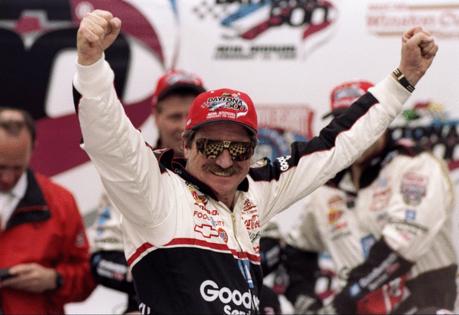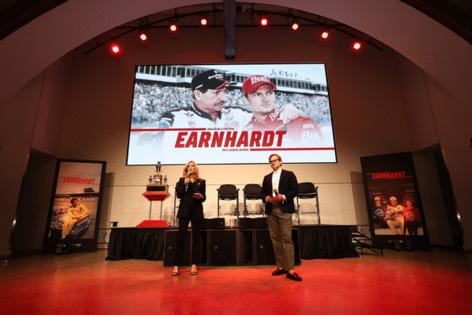Vahe Gregorian: How a 'crisis' led Missouri accounting student to an Oscar and making of Earnhardt doc
Published in Auto Racing
KANSAS CITY, Mo. — When the legendary Dale Earnhardt died in a final-lap crash at the Daytona 500 in 2001, Dan Lindsay was about to graduate from the University of Missouri with a degree in marketing after he’d spent most of his time at MU studying accounting.
He had a vague notion of Earnhardt but was no NASCAR fan. To the contrary: In a freshman year philosophy class focusing on logic and arguments, he had made the case that NASCAR wasn’t a sport.
Now, Lindsay has learned to disagree with his freshman-year self, he said with a laugh during a phone interview with The Kansas City Star amid Amazon Prime’s release of the four-part documentary “Earnhardt.”
Lindsay co-produced the documentary along with several others, including two-time Academy Award winner Ron Howard. The first two episodes launched on May 22; the other two came out on May 29.
But the project was the brainchild of Lindsay, who along with co-producers TJ Martin and Rich Middlemas in 2012 won an Oscar for best documentary feature for their film about three under-privileged students from Memphis and the volunteer coach striving to help.
(Other Academy Award-winners with Mizzou connections: George C. Scott as best actor for “Patton” in 1971; Chris Cooper as best supporting actor for “Adaptation” in 2003 and yet-to-graduate Brad Pitt, both as a co-producer in 2014 for best film (“12 Years A Slave”) and in 2020 for supporting actor in “Once Upon a Time … in Hollywood.”)
The way Lindsay came to this project embodies the broader ways he came to diverge from his freshman-year self and become who he is.
The Earnhardt fascination
He was researching for another project when, presto, he was piqued by something that overlapped with Earnhardt’s story.
“As kind of sometimes happens to me,” he said, “curiosity will get the best of me.”
Suddenly hours into a rabbit hole, he found himself “fascinated by the contours” of Earnhardt’s life and entranced by the distinct community Earnhardt personified even while he became a mainstream icon as a seven-time NASCAR Cup Series champion.
(In ways you might not even realize: For instance, former Royals manager Ned Yost was a close friend of Earnhardt’s and wore jersey No. 3 in honor of Earnhardt’s trademark No. 3 car.)
While Lindsay soon came to realize other documentaries had explored Earnhardt, he also believed nothing delivered the sophistication, gravitas and nuance he’d seek to generate in his chronicling of the larger-than-life Earnhardt, his family, business ventures and enduring impact.
A key part of his pitch to gather support and access, he recalled, was this notion:
“I feel like Dale Earnhardt needs to be understood in wider culture in the way that Babe Ruth or Bob Dylan or even Elvis are. These kind of American folk heroes … (and) impactful cultural figures.”
His once-improbable exploration of Earnhardt is perhaps an extreme example of how Lindsay changed trajectories into a life of artistry.
That also has included a 2017 Emmy with Martin for “exceptional merit in documentary filmmaking” in “LA 92” — about the fallout of the Rodney King trial. The duo was nominated for another Emmy for “Tina,” on the life and career of singer Tina Turner.
But his seemingly unlikely turn actually all connects — and reverberates as an example of what can come from listening to the heart and following a sense of wonder.
Growing up in Rockford, Ill., after all, Lindsay liked doing creative stuff. He played in a band and dabbled in making videos.
But nobody in the home had any regard for that, he said. It was all practicality and business in the family.
By way of example, he pointed to his father wondering why he’d want to buy a VHS copy of a movie he’d already seen. The only one in the house was “Sixteen Candles,” left there by his brother’s friend; Lindsay reckons he’s seen it 150 times.
So when he was heading to MU, the message was clear and ever-present about his artistic inclinations:
“‘Nobody does that stuff. You get a job in business.’ ”
Film school at USC
While he tinkered some with making “silly little videos” his first few years at MU, he’d abandoned the idea that was a career possibility.
Until one day in an accounting class his junior year.
Looking around the classroom, envisioning his future, he experienced what he called “a crisis.”
Because he felt untrue to himself.
That’s a pretty relatable feeling for about anyone, isn’t it?
Whether you can heed that and make the change is another matter.
In his case, he spent the following summer at the USC School of Cinematic Arts.
Further intrigued, when he returned to Mizzou for his senior year, he shifted his major to marketing and used his remaining electives to take theater classes.
Upon graduation, he “led the charge” among some friends to move to Los Angeles and “see what happens,” he said, laughing.
Turns out they’re all still there.
Never mind that he didn’t really know what he was doing.
“That ignorance probably helped me in some ways,” he said. “Because if I’d understood the enormity ... it probably would have scared me.”
For all the intermittent steps between then and now, one episode still resonates most as the essence of it all.
And it has nothing to do with the recognition he’s gotten.
“Those are all incredible things,” he said, “and have their own places in my life (as) memories that I cherish.”
The most moving and gratifying moment, though, was in the final stages of making “Undefeated.”
After some nine months embedded in Memphis as unknowns, years into the labor of love with no indication the movie would make any sort of ripple, it was finally time for a test screening.
The night before, Lindsay and Martin were working in a number of changes urged by film executives.
Around 1 a.m., he turned to Martin and said, “ ‘I hate this. I don’t like any of these changes. This isn’t what we set out to do.’”
Next thing you know, they’re up about all night undoing the changes they’d made.
When they got to the screening, one of the execs asked if they’d had a chance to implement all the notes.
Actually, no, Lindsay told him.
“I thought this guy was going to melt down,” he said.
But it was too late to do anything about it.
Audiences respond, accolades follow
Moments after the film began, Lindsay heard the audience laugh at the right cue and observed how into it the group was.
Soon, he started crying from what he called “the highest high I’ve ever had.”
All because he had made something purely because he wanted to, which tracks with the advice he gives anyone who asks.
Don’t do it for success or recognition itself. Make things because you want to make things.
If a career comes out of that, great. But that’s also going to take some luck and endless work.
Enough so that it does feel like … a job.
Fortunate and privileged as he feels to be doing what he loves, he said, the work comes with ample stress and heartache and annoyances.
But also with rewards beyond anything he could have imagined before he came to the “true fork in the story of my life” at Mizzou.
All this time later, he still feels connected to his alma mater. So much so that when he meets someone from MU or Missouri in Los Angeles, he feels like his “enthusiasm isn’t always matched.”
Meanwhile, his own continues to grow.
“I meet people I would never meet,” he said. “I learn about things I would never necessarily learn about.”
As his latest endeavor illustrates once more.
©2025 The Kansas City Star. Visit kansascity.com. Distributed by Tribune Content Agency, LLC.










Comments